Commercial Providence
COMMERCIAL PROVIDENCE
The Secret Destiny of the American Empire
Foreword by Professor Stephen Joel Trachtenberg
Trachtenberg School of Public Policy
George Washington University
A visitor to the National Archives may stop to notice a wise figure in seated contemplation at the Pennsylvania Avenue entrance, inscribed with the message: “Study the Past.” By carefully examining the influence of Freemasonry on the Founding Fathers, Commercial Providence provides valuable insights for the student of history and the modern political leader alike. It takes the reader on an intellectual and reflective journey to understand the mindsets of the Founding Fathers through little-known linkages between the Pilgrims, Enlightenment philosophers, Thomas Jefferson, Adam Smith, and the Federalists.
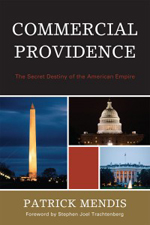 Out of many points of historical curiosity, Commercial Providence creates one vision of America’s founding history. Author Patrick Mendis argues that the American experiment has, since the founding, been grounded in a universal concept of global unity through trade and commerce. Mendis connects American’s esoteric history to this founding conviction through a careful study of the Constitution, the Masonic ideas represented in American symbols, and the structural design of the nation’s capital. Freemasonry is cast as the invisible high priest in American history, guiding the Founding Fathers at every turn.
Out of many points of historical curiosity, Commercial Providence creates one vision of America’s founding history. Author Patrick Mendis argues that the American experiment has, since the founding, been grounded in a universal concept of global unity through trade and commerce. Mendis connects American’s esoteric history to this founding conviction through a careful study of the Constitution, the Masonic ideas represented in American symbols, and the structural design of the nation’s capital. Freemasonry is cast as the invisible high priest in American history, guiding the Founding Fathers at every turn.
History reveals that real world problems are not bound by academic disciplines or formal occupations. Author Patrick Mendis brings an unbounded career and a unique background to his investigation. He was born in Sri Lanka, came to the United States as an AFS exchange student, was adopted by Minnesotans when the civil war erupted in Sri Lanka in 1983, and is now a naturalized American citizen. Through a career spanning academe, government, and the private sector, Mendis has been exposed to an eclectic group of world leaders and scholars. His distinctly American experience adds insight to his perceptive analysis; this book is a testament to what he represents as an American.
Mendis presents an optimistic view of the American experiment and a useful framework for leaders in contemporary crisis situations. His treatise reveals themes of freedom, universal order, and unity in diversity. Unlike Dan Brown in the Lost Symbol, Patrick Mendis has a serious scholarly purpose as he explores the ancient symbols impressed in the architecture of the American capital city: through extensive research, he illuminates the shared belief among many Founding Fathers that the birth of a new nation was a providential act.
By examining the meanings of Masonic symbols and beliefs, Commercial Providence explores the roots of the Founders’ belief in universal and democratic values. The heart of his theory is that the Founding Fathers believed trade and commerce, rather than religion, to be the most effective tools of statecraft and fonts of national unity. Mendis argues that Constitutional architects established a “wall of separation,” as Jefferson described the concept, between church and state to protect the fledgling nation from Old World religious strife, tyranny, and persecution. He extends these beliefs and applies them to modern domestic and foreign policy, maintaining that departure from this founding vision will create domestic religious factions and worsen international tensions.
Reflecting American abolitionist Wendell Phillips’s assertion that “Eternal vigilance is the price of liberty,” Mendis counsels vigilance to the founding wisdom that prescribes trade with all nations and entanglements with none. He concludes that our governing principles were born with conviction, and that without such convictions American policy may spawn dictators and religious zealots to oppose those policies around the world. As a champion of freedom in the world, America stands for none of these fundamentalist endgames.
Thomas Paine could have been describing the first decade of the 21st century when he discussed “the times that try men’s souls.” In truth, American history is replete with trying times. Through depression, war, and civil upheaval, America has been resilient, undergirded by vigilance to her strong constitutional institutions and founding principles. Our enduring American identity rests upon the foundation of shared convictions and shared history. Aspiring leaders, students of history, and visitors to the nation’s capital alike will find Commercial Providence an intriguing look at the origins of our American identity, seen through the eyes of the Founding Fathers and the Masonic Architect of the Universe.
 Professor Stephen Joel Trachtenberg
Professor Stephen Joel Trachtenberg
President Emeritus and University Professor of Public Service
Trachtenberg School of Public Policy and Public Administration
George Washington University
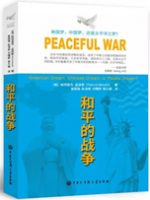
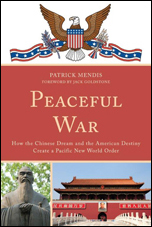 Peaceful War
Peaceful War
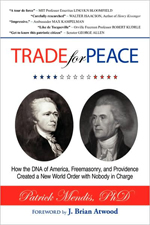 Trade for Peace
Trade for Peace
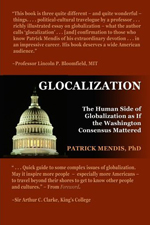 Glocalization
Glocalization